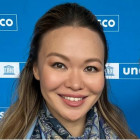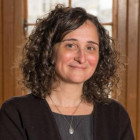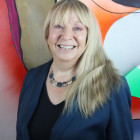Presentation Panel
We Don’t Need No Classroom - Towards a New Role for Universities and Teachers
Date Friday, Nov 25 Time – Room Potsdam I
In an era where so much learning is happening via informal digital channels, “the class” and “the teacher” are becoming anachronistic concepts. Students are increasingly learning in their own way, driven by their own internal motivation, and tracking their own learning process. In this new reality, what role is left for the “providers of classes” (universities) and the “gate keepers to content” (teachers)? Come to this panel and expect conversation and discussion, while adding your own thoughts to the mix.

Alina Kirillina
Education Specialist, UNESCO
Alina Kirillina works at UNESCO’s Future of Learning and Innovation team where she coordinates initiatives that establish norms and standards for digital transformation of education, such as Rewired Global Declaration on Connectivity for Education and Gateways to Public Digital Learning. Previously, Alina served at UNESCO Liaison Office to the UN in New York, where she focused on advocacy and building partnerships on education and lifelong learning.
Alina has more than 10 years of work experience in international cooperation, education, intergovernmental processes and negotiations. She provided analytical and expert support to negotiations on major education-related resolutions of the UN General Assembly.

Amy Zidulka
Associate Professor, Royal Roads University, Canada
Amy Zidulka teaches and researches in the areas of creativity and innovation in the Royal Roads Faculty of Management in Victoria, BC, Canada. She is also the founder and lead of the Royal Roads Design Thinking Challenge and the Design Thinking Educators' Conference.
She has a deep interest in innovative education and has long experimented with how virtual education might be engaging and creative, while serving to connect learners to each other and their personal and professional contexts.

Eline Wigdel
Senior Advisor, Directorate for Higher Education and Skills, Norway
Eline Wigdel has more than 15 years of experience working with online learning, pedagogical use of ICT and flexible learning designs. She is passionate about the learner perspective and strongly believes that flexible learning goes beyond traditional online courses. She has been instrumental in developing the definition of flexible learning used in all parts of the educational sector in Norway. Eline is currently a senior adviser at the Directorate for Higher Education and Skills, implementing flexible learning models in adult training and education through incentive programs and other means throughout the educational sector.
Moderator

Gilly Salmon
CEO, Education Alchemists. Ltd, United Kingdom
Professor Salmon is the founder and CEO of Education Alchemists Ltd - formed around her life's work including Carpe Diem learning design, pedagogical transformation, online education, technology-enhanced teaching, the 5 stage model, e-tivities, and Education 4.0. Until recently Professor of Learning Transformation and pro-vice-chancellor at universities in the UK and Australia, she is now based in London with all workshops offered fully digitally and worldwide. She is a well-known keynote speaker and workshop leader. Her books E-moderating and E-tivities are considered seminal texts
Links
The University as a Hub of Connection: A Vision for a Post-Digital Institution, Amy Zidulka
This presentation will expand your thinking about what a university might look like in the future. It will begin with a brief overview of existing thinking on post-digital and hybrid education, before moving on to a proposal for a new vision for the university. The new vision will serve as a starting point for conversation. Session participants will be invited both to respond to what has been proposed and to put forward their own ideas.
It has been broadly claimed that we live in a post-digital era in which “the digital and online has become thoroughly entangled and integrated into our everyday actions, interactions, and experiences” (Nørgård, 2021, p. 1720). In this context, learning is ubiquitous. More than ever, we learn through digital means in informal settings. As has been noted by scholars of social movement learning, who point to movements like Black Lives Matter and Me Too, some of the most impactful learning of our era has occurred through social media.
Universities are the institutions tasked with shaping education in service of societal good. However, in an era where so much learning is happening via informal digital channels, universities are abdicating their potential positive influence to private corporations who own social media sites.
Currently, universities position themselves as offerers of classes and programs, with a student's engagement with the institution defined primarily through their enrolment in classes.
This presentation's premise is that the class, as the primary unit of education, is an anachronistic concept. While classes will continue to play a role in the educational experience, universities must move beyond being offerers of classes and step into a more encompassing role as hosts of learning environments. Concretely, this would mean that universities would host virtual and face-to-face spaces of community and connection, which would be as central to the learning experience as classes.
Overview
- Review existing thinking around post-digital and hybrid education.
- Imagine new identities for the university and new roles for learners and faculty.
- Consider an expanded role for social media in education.
Education Influencers: The New Role for Online Teachers, Gilly Salmon
Gilly Salmon argues that the online humans are the new ‘Influencers’. She reports on the updated research on how to recruit train and develop for this key role.
From the last Century onwards as ‘e-learning’ and then ‘online learning’ became a real ‘thing’, new skills and competencies were required in the mix. Fortunately thinking has moved away from considering that technology might do away with the humans. Most people consider that the human e-moderators- teachers- tutors, are the pivot around which the learners’ experience revolved. So where are we now? Gilly Salmon argues that the online humans are the new ‘Influencers’. She reports on the updated research on how to recruit train and develop for this key role.
Overview
- Understand the concept of design once, and deliver many times, for online and blended learning.
- Receive a key matrix of competencies and roles to focus on enabling teaching staff for successful delivery.
- Consider how to scale up and contextualise for the post covid learning era.
Flexible Learning is more than Digital, Online or Flipped, Eline Wigdel
This presentation offers new insights in the flexibilization of the education system and invites participants to discuss the challenges and how different models for flexible learning can work across sectors.
To achieve lifelong learning through flexible education, we need to go beyond the dedicated teachers and the single, innovative institution, and see a shift to a more learner centered perspective on a structural and systemic level.
Flexible learning places the learner at the center by providing a learning ecosystem that includes relevant options on multiple dimensions. Dimensions for flexibility include time, location, scope, progress, assessment, formalization, collaboration and content.
While technology plays a part in all learning offered, it is not the essence of flexible learning. It is more appropriate to view technology as a set of tools that can support flexibility, rather than seeing the use of technology as flexibility.
In the presentation, we will show how flexible learning models are implemented within some sectors in Norway. We will also share our experience and the problems we have faced by stretching the dimensions for flexible training as much as possible, to the point of achieving "full flexibility". We want to discuss and exchange ideas with peers on how these models could be used not only for adult learners, but also to make primary and seconday school as well as higher education accessible, relevant and motivational for all.
Reasserting Public Education on the Internet and Keeping Schools, Classrooms and Teachers at the Center of Digital Transformation of Education, Alina Kirillina